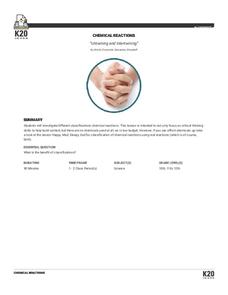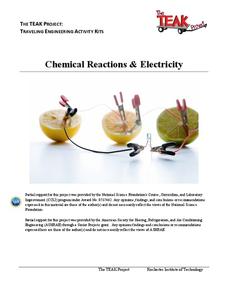Curated OER
Heat Energy Released or Absorbed in Chemical Reactions
Chemistry whizzes test the change in water temperature produced by a burning candle and the change in acid temperature produced by magnesium metal. With these two laboratory activities they explore heat produced during chemical...
American Chemical Society
Production of a Gas - Controlling a Chemical Reaction
Though the publisher designated this unit for use with third through eighth grades, this particular lesson would be best used with middle schoolers due to the specific measurement skills required. Basically, they set up the reaction...
Cornell University
Predicting Chemical Reactions
Prove the Law of Conservation of Mass through a lab investigation. A well-designed lesson asks groups to combine materials and monitor indicators for chemical reactions. Measuring the mass of the reactants and products allows individuals...
Cornell University
Chemical Reactions
Investigate the Law of Conservation of Mass through a lab exploration. Individuals combine materials to initiate chemical reactions. They monitor for signs of reactions and measure the masses before and after the reactions for...
American Chemical Society
Temperature and the Rate of a Chemical Reaction
Putting glow sticks in the freezer makes them last longer, but why is that? Lesson focuses on how temperature impacts the rate of a chemical reaction. It begins with a teacher demonstration, then scholars design their own experiments...
Curated OER
Observing Chemical Reactions
Start this series of lessons with a bang! Five exothermic reactions are outlined in this resource, including a demonstration that produces both light and sound. In the lab, chemistry apprentices record temperature changes, make hand...
K20 LEARN
Untwining And Intertwining: Chemical Reactions
What happened when the chemistry teacher told a bad joke? There was no reaction! A creative take on the traditional reaction types lesson invites learners to draw their own conclusions about how compounds and elements combine. Groups...
Chymist
Esters: An Introduction to Organic Chemistry Reactions
Scratch and sniff an introduction to organic chemical reactions. A creative activity has individuals study the esters commonly used in scratch-and-sniff stickers and advertisements. Following the lab procedure, scholars create the...
Rochester Institute of Technology
Chemical Reactions and Electricity
After a discussion of chemical reactions and electricity, scholars break into groups and follow a scripted activity to discover if fruit can power a clock. After a concluding discussion, the class a presented with a challenge.
Massachusetts Institute of Technology
Lego Atoms and Molecules: Chemical Reactions
Show young chemists what a chemical reaction looks like with two parts of a hands-on experiment. First, learners conduct a wet lab where they observe the reactants (baking soda and calcium chloride, with phenolsulfonphthalein)...
American Chemical Society
Chemical Reactions and Engineering Design
Construction leads to habitat loss and local wildlife suffers. Scholars must build a reptile egg incubation device that meets many constraints. Various experiments help them discover the chemical reaction needed to reach...
Curated OER
Chemical Formulas for Molecules
Newcomers to chemistry compare hydrogen peroxide to water, realizing that the difference of one oxygen atom significantly affects the chemical properties. Other pairs of compounds and their formulas are also examined. A few chemical...
Curated OER
Eggs'ceptional Experiments
Students see evidence of chemical reaction and follow the scientific method to hypothesize, observe, and reach conclusions. They conduct a series of egg based experiments such as forming crystals and complete journal activities as a...
Curated OER
5 Types of Chemical Reactions and a Lab on Mole
Learners recognize the concepts of the five general types of chemical reaction: combination, decomposition, single replacement, double replacement and combustion. They practice classifying chemical equations and determine the moles in a...
Cornell University
Energy Changes in Chemical Reactions
The heat of solution measures how much thermal energy a dissolving substance consumes or gives off. The experiment demonstrates both endothermic and exothermic reactions. Scholars dissolve several substances, measure the temperature...
Curated OER
Chemistry: Chemical Reactions
Students investigate chemical reactions. In this chemistry lesson, students burn magnesium and record the mass. Students list five chemical reactions they see everyday.
Virginia Department of Education
The Rate of a Chemical Reaction
If your pupils think a catalyst is a list of their cats, then this might be the lesson for you! Young chemists study the effect of temperature, catalysts, concentration, and particle size on reaction rates during four different...
Curated OER
Factors that Affect Reaction Rates
Collaborating chemistry pupils observe that temperatrue increases the movement of dye throughout water, stirring increases the dissolving rate of sugar cubes, and concentration of solutions increases the chemical reaction rates. These...
University of Georgia
Endothermic and Exothermic Reactions
Equip your chemistry class with the tools to properly understand endothermic and exothermic reactions. Young chemists collect, analyze, and graph data to determine how the Law of Conservation of Matter is applied to chemical...
American Chemical Society
A Catalyst and the Rate of Reaction
More than 90 percent of chemical products are made using a catalyst. Lesson demonstrates the way a catalyst changes the rate of reaction without altering the chemical reaction. A catalyst doesn't appear as a reactant or a product, yet it...
Curated OER
Physical and Chemical Reactions - Factors Which Affect Reaction Rate
A total of five experiments lead chemistry pros to understand the difference between physical and chemical change. They also experiment with exothermic reaction factors that affect rate of reaction. The procedures are not written in the...
American Chemical Society
Controlling the Amount of Products in a Chemical Reaction
Everyone enjoys combining baking soda and water. Here is a instructional activity that challenges scholars to analyze the reaction three different ways — the real substances, the chemical equation, and the molecular...
Curated OER
Chemical Reactions
In this chemical reaction worksheet, students investigate the results of mixing calcium chloride with sodium bicarbonate. They observe the chemical and physical changes that occur, identify the properties of the chemical before and after...
Curated OER
Chemical Word Equations
In this chemical reaction worksheet, students write a balanced equation for each of the word equations given. This worksheet has 12 problems to solve.

























